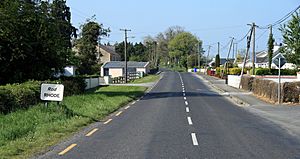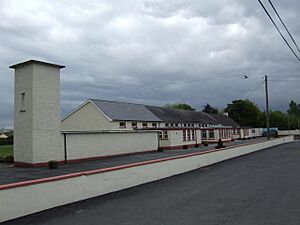Rhode, County Offaly facts for kids
Quick facts for kids
Rhode
Ród
|
|
|---|---|
|
Village
|
|

Rhode, approaching from the North on the R400
|
|
| Country | Ireland |
| Province | Leinster |
| County | County Offaly |
| Population
(2016)
|
811 |
| Time zone | UTC+0 (WET) |
| • Summer (DST) | UTC+1 (IST (WEST)) |
| Eircode routing key |
R35
|
| Irish Grid Reference | N533335 |
Rhode (Irish: Ród) is a village in County Offaly, Ireland. It is located on the R400 road. The village is about 12 kilometers (7.5 miles) west of Edenderry. Rhode sits on an "island" of higher ground. This area is surrounded by a large bog, which is a type of wetland.
Contents
History of Rhode Village
The Grand Canal runs just south of Rhode village. This canal was finished in the early 1800s. Rhode Bridge, built around 1797, crosses the canal here. Some of the older buildings in the village, like Saint Peter's Roman Catholic church, were built around the same time. The church was first built in 1816.
Power Plant and Its Impact
The modern village of Rhode grew around a power plant. This plant used peat (a type of fuel from bogs) to make electricity. The Electricity Supply Board ran the plant, and Bord na Móna supplied the peat. The power plant closed down in 2003. Its tall cooling towers were taken down in March 2004. These towers used to be a very noticeable landmark in the area.
Life in Rhode Today
Rhode has a local primary school called Scoil Mhuire Naofa. It opened in 1959. In 2020, more than 150 students attended the school. The village is also home to the GAA team, Rhode GAA. This team has won the most Offaly Senior Football Championship titles in County Offaly.
Village Services and Fun
The village has several useful places for residents and visitors. You can find three pubs, two takeaway restaurants, and two shops. There is also a filling station, hairdressers, and a pharmacy. In the center of Rhode, there is a playground and a park. These are great places for kids to play and for families to relax.
Notable People from Rhode
- John Dunne (1846–1916) was a Roman Catholic priest. He later became a bishop in Australia.
- William Fletcher (1750–1823) was an important judge in the High Court.
See also
 In Spanish: Rhode (Offaly) para niños
In Spanish: Rhode (Offaly) para niños



